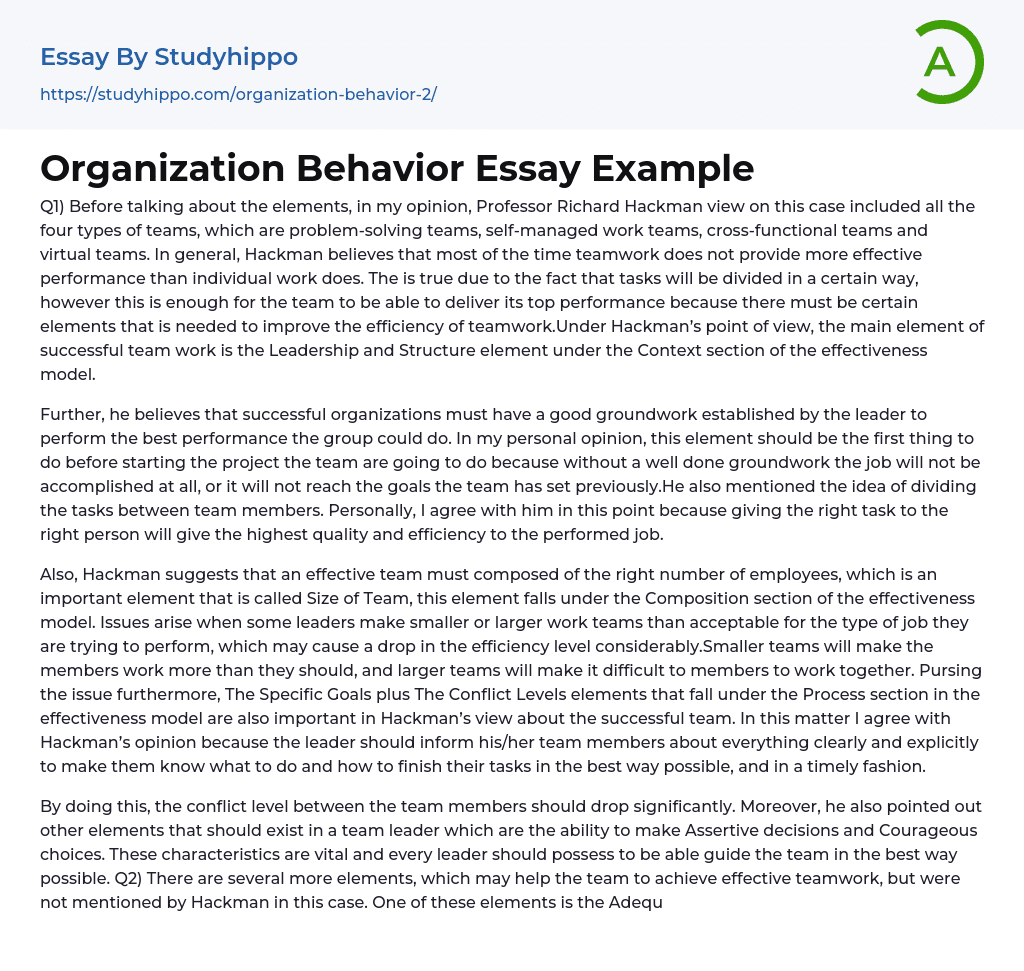According to my view, Professor Richard Hackman's perspective encompassed problem-solving teams, self-managed work teams, cross-functional teams and virtual teams. Hackman generally believes that team work is not always more effective than working individually due to task division, but there are certain elements required for improved efficiency of teamwork. Hackman identifies Leadership and Structure as the crucial elements for successful team work, which fall under the Context section of the effectiveness model.
The leader's role in establishing a strong foundation is essential for an organization to succeed. Prioritizing this before starting any project is crucial, as without it the team may struggle to achieve their goals. Assigning tasks accurately to team members can also enhance quality and efficiency in their work, which I fully support.
Hackman believes that an effective team must have the right number of employees
..., which falls under the Composition section of the effectiveness model. It is important to avoid making smaller or larger work teams than optimal for the type of job, as it can significantly decrease efficiency. Smaller teams result in increased workload for members, while larger teams make collaboration difficult. Additionally, The Specific Goals and Conflict Levels elements under the Process section are crucial for a successful team in Hackman's view. I concur with Hackman that clear communication from the leader is vital to ensure team members understand their tasks and perform them effectively and efficiently.
According to Hackman, reducing conflict levels among team members is essential. The team leader must possess assertiveness and courage to make necessary decisions. While these qualities are crucial, there are additional elements that may contribute to effective teamwork. Adequate resources of information and data on the tasks
at hand can provide the team with confidence and eliminate any doubts that may hinder successful completion of the job.
Trust, Performance Evaluation and Reward System, and Common Purpose are essential elements for effective teamwork. Trust among team members helps to create a comfortable and productive work environment that leads to quality output. Properly developed Performance Evaluation and Reward system enable teams to give both positive and negative feedback. This feedback is crucial for team improvement as it helps in identifying weaknesses and maintaining strengths. The presence of a Common Purpose is necessary to avoid conflicts that may arise from diverging goals among the team members. Other important factors that should be considered for achieving effective teamwork include preparing team members before meetings, planning the teamwork in general, and focusing on the final result.
Q3) To establish a teamwork system for a task, I would follow specific steps. First, I will conduct research to assess the situation and select team members based on the necessary skills for the task. I will ensure diversity amongst the team based on their backgrounds and abilities. Next, I will clearly communicate the task and goals to the team and assign tasks according to their skills and knowledge. To avoid issues identified by Hackman, I will maintain the company's strategy and vision while working as a leader rather than a boss. By embodying qualities outlined in the effectiveness model, I can gain trust and support from my team members throughout the work process.
Striving to motivate my subordinates and enhance their sense of ownership, I aim to emphasize the personal benefits of performance over collective ones. To incentivize high-quality work, a bonus
or potential job opportunities could be awarded based on each member's individual contributions. In order to ensure transparency and accountability, I propose implementing a virtual forum that records all team submissions, such as Microsoft's SharePoint, which saves every version of the documents and identifies the person responsible for changes and submissions. Additionally, by establishing an environment that encourages constructive criticism, negative feedback can be given comfortably to address any issues that may arise during the project.
- Perseverance essays
- Expressive essays
- Character Traits essays
- Apology essays
- Compassion essays
- Being A Leader essays
- Servant Leadership essays
- Leadership Experience essays
- Leadership Qualities essays
- Adult essays
- Aggression essays
- Altruism essays
- Archetype essays
- Behavior essays
- Certainty essays
- Conformity essays
- Deception essays
- Human Behavior essays
- Human Sexuality essays
- Maturity essays
- Morality essays
- Obedience essays
- Procrastination essays
- Reinforcement essays
- Role Model essays
- Board Of Directors essays
- Brand Management essays
- Business Ethics essays
- Business Management essays
- Change Management essays
- Comparative Analysis essays
- Decision Making essays
- Dispute Resolution essays
- Knowledge Management essays
- Leadership essays
- Leadership and Management essays
- Manager essays
- Operations Management essays
- Performance Management essays
- Product Management essays
- Project Management essays
- Quality Management essays
- Risk essays
- Risk Management essays
- Scientific Management essays
- Stress Management essays
- supply chain management essays
- Time Management essays
- Total Quality Management essays
- Administration essays




